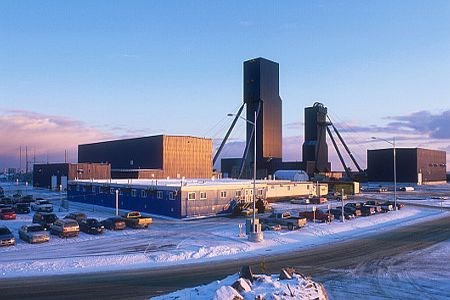Xstrata Nickel has chopped 686 jobs from its Sudbury workforce, blaming poor market conditions and shrinking demand for the move.
"We simply can't carry on with business as usual, and these actions are absolutely necessary," says Marc Boissonneault, vice-president of Xstrata Nickel Sudbury Operations.
"Essentially, demand for our products has collapsed. We're having to make these changes to structure ourselves to survive the bottom of the economic cycle, so it's about survival in the short-term and putting ourselves in the position to have a foundation to be successful in the longer term as well."
As part of the Feb. 9 announcement, the Fraser Mine Complex is being placed on care and maintenance, while the Strathcona Mill will be reduced from four shifts to two due to the reduction in feed.
The Craig and Thayer-Lindsley mines, which were to be closed February 2009 and second-quarter 2009 respectively, are instead being ceased immediately.
The Fraser Morgan development project, which is connected to the existing Fraser Mine Complex, is also being deferred. As "a more marginal mining opportunity," the project requires an improved market to be reconsidered, which is unlikely to occur by 2010, says Boissonneault.
Local operations will be shut down for three days while company officials hammer out details of the job cuts with union representatives, though some have already been established by collective agreements.
For production and maintenance workers, this would likely mean a severance package allowing for a settlement for $1,000 per year of service with a minimum of $4,000 and a maximum of $40,000, and termination pay "in the neighborhood of approximately four months," says Boissonneault.
As the shutdowns are centered on mining operations, the cuts are "heavily weighted" towards production and maintenance workers, with some associated office and clerical losses.
Regardless of the necessity of the move, a somber Boissonneault says it was not something the company did easily, particularly with the loss of many experienced and valued personnel.
"It's a very difficult decision for us, and it's not been taken lightly. A lot of the employees leaving us over the next few days have been a big part of our success in the last few years, so it's a really tough time for us and for all of them."
The move will not affect the local Nickel Rim South project, which will continue to ramp up to 60 per cent of its expected 1.25 million tonne-per-year production capacity in 2009. The project represents nearly $1 billion in investment, with $627 million having been spent on its first phase, and another $300 million yet to be spent on completing mine development and infrastructure.
Continued work on this project remains the sole bright spot in the day's job cuts, says Minister of Northern Development and Mines Michael Gravelle.
Having fielded a phone call from Xstrata chief executive Ian Pearce the morning of the announcement as a heads-up to the upcoming cuts, Gravelle says it was made clear that the company was still committed to moving forward with the Nickel Rim South project.
"This is devastating news, no question," says Gravelle. "But if there's any silver lining at all, it's the continued commitment to [Nickel Rim South], which speaks to the company's belief that things will turn around, and in its continued presence in this province."
The anticipated impact on the community is still being gauged as shockwaves continue to roll throughout the city, while government and business associations alike struggle to grasp its meaning.
"We're disappointed," says Dick DeStefano, executive director of the Sudbury Area Mining Service and Supply Association. "The impact will be dramatic, and while the impact has not filtered through to our suppliers, but there will be an impact on the amount of supplies that are purchased. We haven't evaluated how that will affect us, but there will be discussions with Xstrata's management group in the next month or so to see how that translates to our members in Northern Ontario."
While acknowledging the enormity of the loss of nearly 700 skilled, high-paying jobs, Mayor John Rodriguez remained optimistic and downplayed the long-term effect on the city.
The diversification of the city's economic base through education, health care and retail will help Sudbury to weather the storm, the likes of which the city has seen before, he says.
"We've been keeping our fingers crossed, praying and hoping that what's happening in the world will somehow pass us by, but it's landed on our doorstep. Thankfully, while these mining companies are an integral economic element in the city's outlook, they're not absolutely crucial to the city's economy."
Rodriguez says the city must continue its search for additional wealth-generating opportunities to further increase the community's ability to look beyond the mining sector.
He adds it is for reasons such as these such these that the highly controversial $150-million performing arts centre and multi-use recreational complex, nixed by city council last fall, were so important.
Other reactions from across the region have come from the provincial NDP, which promptly renewed their call for an industry-standard industry hydro rate of $45 per megawatt hour to protect Ontario's resource-sector jobs.




